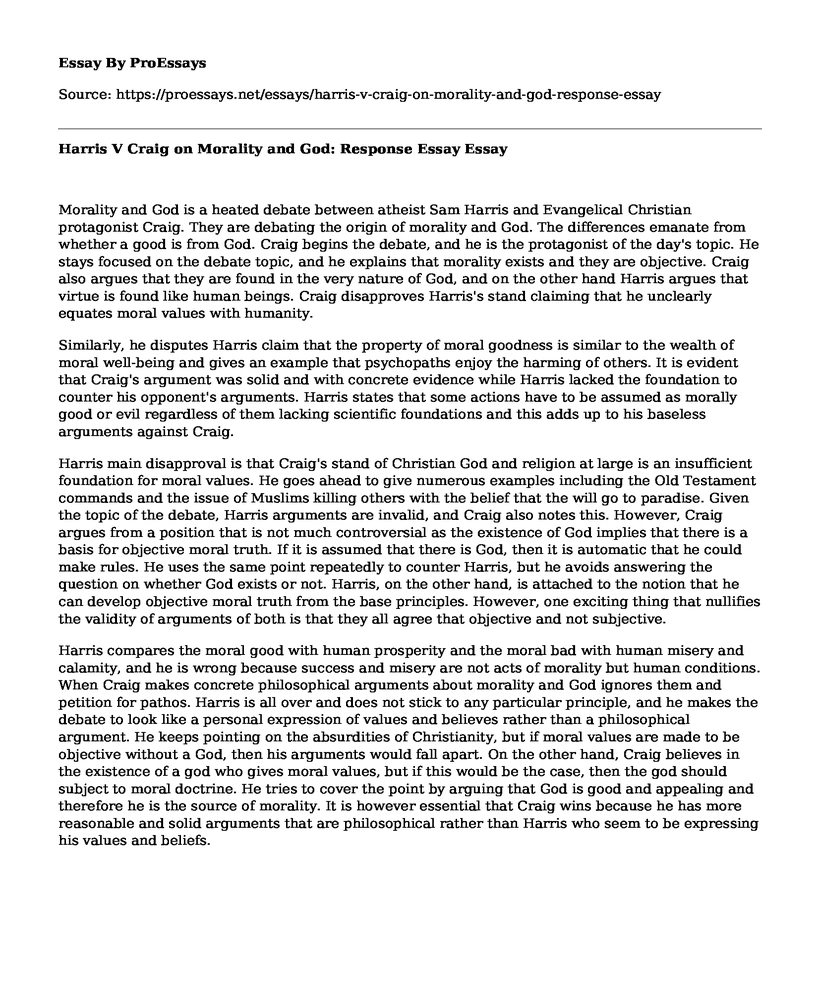Morality and God is a heated debate between atheist Sam Harris and Evangelical Christian protagonist Craig. They are debating the origin of morality and God. The differences emanate from whether a good is from God. Craig begins the debate, and he is the protagonist of the day's topic. He stays focused on the debate topic, and he explains that morality exists and they are objective. Craig also argues that they are found in the very nature of God, and on the other hand Harris argues that virtue is found like human beings. Craig disapproves Harris's stand claiming that he unclearly equates moral values with humanity.
Similarly, he disputes Harris claim that the property of moral goodness is similar to the wealth of moral well-being and gives an example that psychopaths enjoy the harming of others. It is evident that Craig's argument was solid and with concrete evidence while Harris lacked the foundation to counter his opponent's arguments. Harris states that some actions have to be assumed as morally good or evil regardless of them lacking scientific foundations and this adds up to his baseless arguments against Craig.
Harris main disapproval is that Craig's stand of Christian God and religion at large is an insufficient foundation for moral values. He goes ahead to give numerous examples including the Old Testament commands and the issue of Muslims killing others with the belief that the will go to paradise. Given the topic of the debate, Harris arguments are invalid, and Craig also notes this. However, Craig argues from a position that is not much controversial as the existence of God implies that there is a basis for objective moral truth. If it is assumed that there is God, then it is automatic that he could make rules. He uses the same point repeatedly to counter Harris, but he avoids answering the question on whether God exists or not. Harris, on the other hand, is attached to the notion that he can develop objective moral truth from the base principles. However, one exciting thing that nullifies the validity of arguments of both is that they all agree that objective and not subjective.
Harris compares the moral good with human prosperity and the moral bad with human misery and calamity, and he is wrong because success and misery are not acts of morality but human conditions. When Craig makes concrete philosophical arguments about morality and God ignores them and petition for pathos. Harris is all over and does not stick to any particular principle, and he makes the debate to look like a personal expression of values and believes rather than a philosophical argument. He keeps pointing on the absurdities of Christianity, but if moral values are made to be objective without a God, then his arguments would fall apart. On the other hand, Craig believes in the existence of a god who gives moral values, but if this would be the case, then the god should subject to moral doctrine. He tries to cover the point by arguing that God is good and appealing and therefore he is the source of morality. It is however essential that Craig wins because he has more reasonable and solid arguments that are philosophical rather than Harris who seem to be expressing his values and beliefs.
Cite this page
Harris V Craig on Morality and God: Response Essay. (2022, Mar 27). Retrieved from https://proessays.net/essays/harris-v-craig-on-morality-and-god-response-essay
If you are the original author of this essay and no longer wish to have it published on the ProEssays website, please click below to request its removal:
- Female Suicide Bombers
- Personal Essay Example: Struggling with Identity
- Omniscience of God Essay
- Comprehend Basic Theories of the Use of Denial and Deception in Shaping Perception
- Definition of Meaningfulness, Happiness, and Morality Using Todd May Ideas
- Ethics and Critical Thinking: The Stanford Prison Experiment
- The Relationship Between Group and Individual Identity - Essay Sample







